President Amy Parsons presented awards to five employees and one advisory council at the April 20 Classified Personnel Council meeting in the Lory Student Center.
The annual CPC honors given to state classified staff include the Outstanding Achievement Award and the Positive Action Award.
The Positive Action Award went to the Technician Advisory Council at the James L. Voss Veterinary Teaching Hospital. The group was established in early 2022 to create a unified presence within the hospital so state classified employees have recognized representation in major decisions made for the future of the VTH.
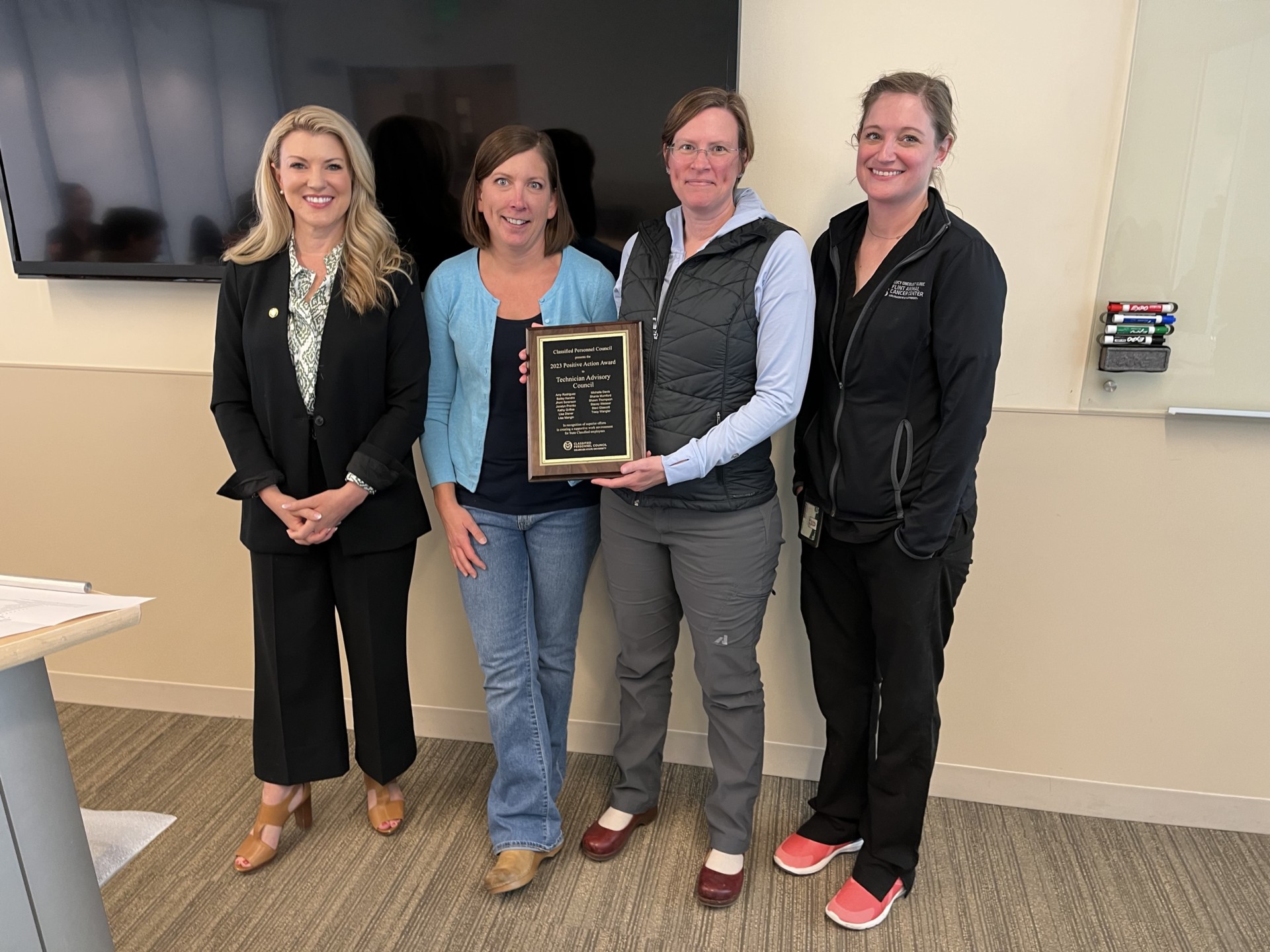
Council contributions
According to nomination materials, the group has contributed to a significant improvement in the culture for the vast number of employees who aid in the function of daily operations at the VTH. The veterinary technician career path is well known for turnover due to very high workload, and the council has addressed concerns regarding workloads and has established a process for voicing concerns. That has resulted in better advocacy for state classified veterinary technicians.
Among the council’s accomplishments are working with the administration on issues around work environment, pay increases, benefits, opening channels of communication, continuing education opportunities, coordinating a technician-specific appreciation week, and bringing specific needs of the technical staff to the attention of the hospital administration.
Five staffers received Outstanding Achievement Awards. The recipients, and materials from their nominations, are below.
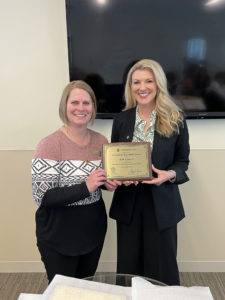
Kim Chacon
Chacon came to the Department of Computer Science in December 2020 as an accounting technician and has become one of the most dependable partners in the department.
She embodies the spirit of service to the community and students, promoting CSU’s land-grant status with integrity and a smile. Her nominator said she “has never doubted to tell me … when something is not possible. She is our check and balance, our ethical compass regarding finances. But more than that, she is a great colleague and a friendly person to all of us, regardless of the position. Please make no mistake about it. Great staff like Ms. Chacon make the work of our faculty possible.”
Staff discuss leave, pay concerns
After the April 20 awards ceremony, Parsons gave a few remarks and answered questions.
CPC Chair Adrian Macdonald noted that early last June, former President Joyce McConnell provided employees up to 24 hours of administrative leave for professional development activities in the upcoming fiscal year. She also asked the CSU community to avoid scheduling meetings on Fridays and restrict email to only “operationally critical” messages those days. Macdonald asked if Parsons would continue those practices, and she invited feedback from the council on how they felt about the moves.
Several staffers said employees deeply appreciated the actions, although not all staff members were able to use the administrative leave for professional development due to the demands of their jobs.
Some noted that many staff are also too busy with their jobs to take advantage of their employee study privilege, and that CSU does not offer enough night classes that staff members can take after regular work hours.
Others told Parsons that CSU is struggling to retain certain kinds of employees, especially those in trades like electricians and plumbers, because compensation levels are not keeping pace with the private sector. Former CPC Chair Stacey Baumgarn suggested conducting a living wage exercise, similar to the one done in 2015-16.
Some staff expressed concerns about affordable housing and compression, which results in new employees receiving a starting salary that is higher than colleagues who have been at CSU much longer. Council members also noted that while the state controls the salary ranges for classified staff, many are at the low end of their range, even after working at CSU for many years.
Parsons pledged to work on those issues and said she is a big believer in shared governance. In her introductory remarks, she noted that as a CSU student, she worked for Facilities Management in the Lory Student Center. And later, as vice president for university operations, she said she worked closely with CPC and the other employee groups on initiatives like Commitment to Campus.
Always going the extra mile, Chacon has been part of the Computer Science Operations Committee, and has served on numerous search committees. In addition to her job of managing all faculty accounts, she manages the accounts of the Cybersecurity Center, for which she receives no additional remuneration. Despite her tremendous workload, Chacon takes on the responsibilities of the other staff members when they are unreachable and does everything with a great disposition.
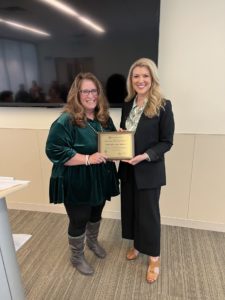
Debi Krogh-Michna
Krogh-Michna has served as a program assistant in the Department of Occupational Therapy for 14 years. She is a stalwart supporter of students, the OT department and community partners.
Krogh-Michna’s primary duties within the OT department include scheduling fieldwork rotations, establishing contracts with community sites, and managing all prerequisites and paperwork associated with fieldwork experiences. She has visited community partners many times after work hours to attend special events such as grand openings and fundraisers. When a community partner was interested in developing an art-based program for adults with intellectual and developmental disabilities, Krogh-Michna connected the partner with the city’s adaptive recreation program and set up an after-work meeting with all interested parties.
She worked tirelessly to support students in different capacities, including facilitating activities with a student-run organization. She was instrumental in working with the development office to secure a $50,000 DiverseOT student scholarship. Krogh-Michna also has a long-standing relationship with Cooper Home, an organization that supports job training for young adults with disabilities. She and her family established an OT student scholarship that supports student veterans or those with a tie to the military.
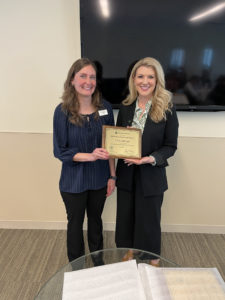
Kristy Millsapps
Millsapps is the operations manager at the Lory Student Center, where she has worked since 2017. Her supervisor said, “Kristy has successfully navigated the workplace, specifically the LSC, to learn the specifics of the job, to work as a team member with our group, and to provide excellent customer service for all who contacted our office to find solutions for their problems.”
She served on the LSC ‘s Mission 2020 committee and as project lead for the LSC in CSU’s effort to adopt a new and highly progressive work order and preventative facility maintenance system. Her colleagues in the LSC have tremendous confidence in Millsapps, and her work ethic is reflective of her ability to approach projects with the highest level of detail. She brings thoroughness, care, and a sense of professionalism.
One of her student employees wrote: “Kristy is one of the greatest people I’ve met in my time at CSU. When I began working at the LSC, I started as a student custodian. From the time I started, she went out of her way to establish a connection with me, and after a few months came to me and offered me a job helping her in the operations office. It was the easiest ‘yes’ I’ve had so far here at CSU, but not because of the pay, career advancement, or type of work. It was because she came to me and said, ‘You seem like you need a change, you’re good at these things, and I would love to have you work for me.’ She went out of her way to improve the quality of my life not only as a student at CSU, but as a human being. That’s just who she is, and as long as she’s here, I will be working for her.”
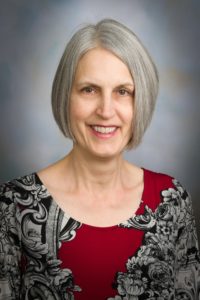
Susan Rutherford
Rutherford has dedicated her career to improving the health and well-being of students at CSU for the past 27 years. She has been an integral part of the physical therapy department at the CSU Health Network, but her reach in enhancing the lives of the CSU student population goes much further.
She chose two of the most complicated specialties in the orthopedic physical therapy world: hand care and post-concussive care. Rutherford is the only therapist qualified to oversee the hand specialty orthopedic clinic at CSU. Her expertise allows her to assist orthopedic hand surgeons. She makes specialty hand splints, casts, and braces, often working extra hours. Rutherford is also one of the only physical therapists in northern Colorado who specializes in post-concussion care.
She supervises, trains and mentors eight to 10 work-study students who serve as physical therapy aides in the clinic. Rutherford has assisted more than 50 students in pursuing graduate health care degrees beyond graduation at CSU. Her mentoring efforts have helped many CSU students follow their dreams of becoming a physical therapist and/or health care professional. She is exceptionally kind, considerate and, above all, selfless.
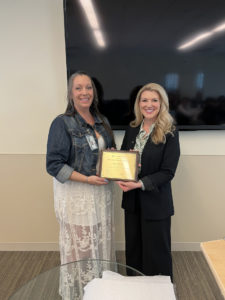
Brie Zamora
Zamora is a mental health care coordinator at the CSU Health Network. She was hired a decade ago as a medical assistant, but because she has been so capable and dedicated to student welfare, her job has morphed dozens of times. When the psychiatry division director left in fall 2021, she kept the division running by onboarding locum tenens providers – something definitely outside her job description.
Zamora brought the new director of psychiatry up to speed on everything about scheduling, policies and procedures, and resources around campus. She has gone out of her way to individualize care to each student she meets and assists them with referrals to outside providers, teaching them how to understand their insurance benefits, connecting them with therapists and substance abuse treatment programs, and providing resources for unmet needs (like scholastic help or food insecurity).
Many students have reported to the Health Network that they sought help for a long-standing mental health issue because a fellow student told them to go see Zamora. It is impossible to quantify the number of students who have been positively affected by her care.